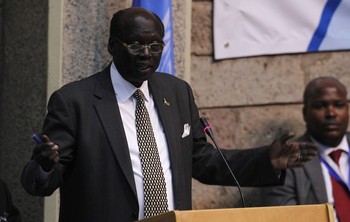S. Sudan unveils new strategy to strengthen relations with Sudan
August 14, 2013 (JUBA) – South Sudan unveiled a new diplomatic strategy on Wednesday aimed at strengthening relations with the government of Sudan at three levels, according to a senior diplomat.

Ambassador Makol was speaking at a media briefing after the new minister for foreign affairs and international cooperation Barnaba Marial Benjamin held talks with senior ministerial staff during which he asked for their cooperation.
“Our priority as the ministry is to establish and build relations with our neighbouring countries and beyond – this starts now with the Republic of Sudan. We have to engage them at any level. We will do this at the level of the African Union (AU), through [the] cooperation agreement and at the ministry level”, Makol said.
He said the Sudanese government had recently responded well to international and regional efforts to contain differences between the two countries and had allowed oil to continue flowing to international markets through Sudanese territory.
Meanwhile, Marial said he received assurances of support from Chinese government to do what was necessary to promote bilateral between two the countries.
“Our relations with China are steady and growing very well. I was in the meeting with Chinese special representative for African affairs and the delegation. They came to hear from us what we are doing as the government and to also share with us what role they will play in promoting relations between the two countries and with other countries as well”, Marial told journalists.
Special representative Zhong Jianghua said relations between his country and the new nation were witnessing rapid development, with closer high level contacts, strengthened mutual political trust, as well as fruitful cooperation in areas of oil, transport and infrastructure.
“China attaches great importance to maintaining and promoting relations with South Sudan as it does with other African countries to cement friendship between the countries and [for the] development [of] pragmatic cooperation”, Jianghua told reporters following the meeting.
The senior diplomat said his country will continue to play a positive role in assisting the two Sudans to resolve their differences amicably without causing disruption to oil flows.
He added that with both governments relying heavily on oil revenues for development, China would continue to engage with the leadership of the two countries in an effort to normalise relations and enhance cooperation between the two nations.
The Sudanese government on Monday announced that it had agreed to further extend the deadline to stop the flow of South Sudanese crude through its territory, saying that this decision was taken in response to a request made by president Salva Kiir.
Last March, the two countries signed a deal outlining a timeline for the implementation of all nine cooperation agreements signed by the two countries a little under a year ago.
This included a timetable for the resumption of oil exports that were suspended for more than a year over a disagreement on transit fees.
However, the implementation process broke down amid claims by Sudan that Juba had breached the deal by continuing to provide support to rebel groups fighting for regime change.
South Sudan denies the claims and countered with accusations that Khartoum is backing rebels in Jonglei state.
(ST)
